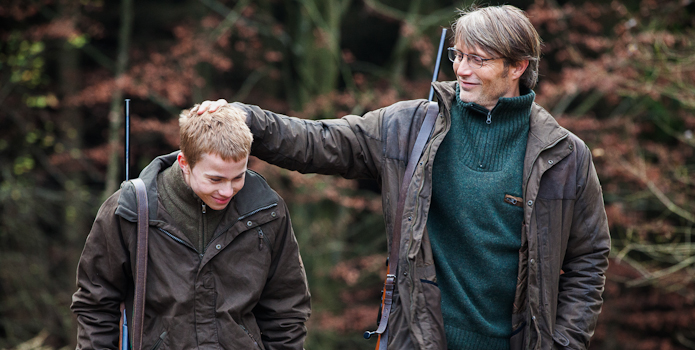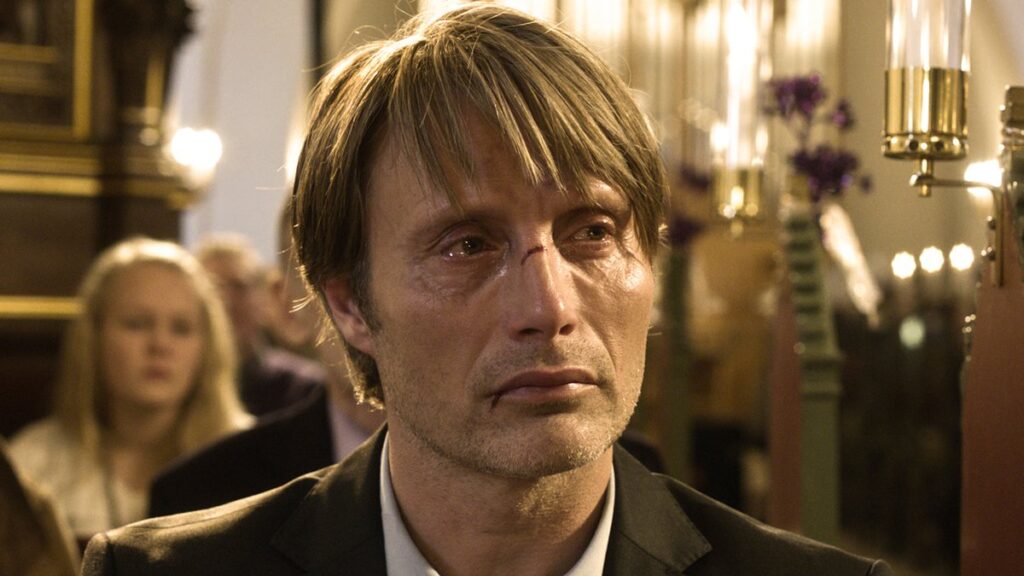On this second article over foreign language films worthy of attention, I’ll be reviewing the Danish movie Jagten, or The Hunt. Directed by Thomas Vinterberg and starring Mads Mikkelsen, this is quite a popular movie that contributed to the international fame of both its director and its lead. And deservedly so. The Hunt is a movie that holds a tight grip over its audience from the very start and keeps it throughout by compounding tension, dread, injustice and despair over its characters after only a handful of scenes.
The movie tells the story of Lucas, a divorced father of an adolescent son, who was at one time a teacher, but due to economic difficulties is now working at a nursery with small children. In this position he has found some stable footing, seemingly liking this new job and even starting a romantic relationship with a coworker. All seems well until the daughter of one of Lucas’ friends, Klara, who also goes to Lucas’ nursery develops somewhat of a childlike infatuation for Lucas, and presents him with a gift, that he politely turns down. Misconstruing Lucas’ polite rejection, the child concocts a story about Lucas exposing himself to her and tells the school administrator.
From that point on, and before Lucas or the audience even properly register what has happened, a malicious cloud of suspicion and persecution hovers over the protagonist as his entire community turns on him.

Parents are worried a predator is hanging around their children, Lucas’ fellow workers no longer want him working at the nursery, his friends avoid him and reject his attempts at reasoning. Suspicion turns into paranoia, and it is a behavior that is not entirely unbelievable as people tend to be very paranoid, protective, and sometimes blind when it comes to their children, and it is the same case here.
The pain, frustration and genuine anger that Lucas feels in regard to the whole situation is wonderfully transmitted by Mikkelsen, who is able to tell so much about Lucas’ state of mind with just his eyes and mouth. The movie relies on that ability of its actors more than anything. Dialogue is light and economic, making us wish the characters would say more to each other to clarify the situation, but the fact that they don’t is totally within reason, and one of the things that makes the story so deeply compelling.
It’s definitely a story that says a lot about the dangers of mob mentality and casting societal judgement and downright expulsion without evidence and outside the boundaries of the legal system. Somehow, I feel like it has gotten more relevant as the years have gone on. With the increased detachment of people from each other through the digital sphere, people can incur on literal hunts of other who demonstrate any sort of censorable behavior and persecute them relentlessly from the comfort of their own homes. The Hunt shows us what it’s like to be on the other side of that, but it isn’t without a level of biasness. The fact that we know that Lucas is innocent from the very start makes us side with him and obviously be against the community that stands in firm opposition to his very existence.

If we saw the story from Klara’s parents’ point of view, however, we might think that they were right to be at least wary of Lucas. We might potentially think that they should hear him out, but we would at least be suspicious as well. And I think that’s what the movie is brilliantly trying to get at. Ultimately Lucas’ deepest anger isn’t that the community doesn’t believe him, he understands that it’s his word against that of an innocent child. But rather, what’s really frustrating to him and to us is that they won’t so much as hear him out, and that no benefit of the doubt is extended to him, even though he is not placed under arrest or convicted for any crime.
We all judge in our lives. It’s normal, it’s human. But we have individuals, in most societies of the world, whose job, responsibility and right are to judge. And we sometimes tend to forget that, and in many certain situations we shouldn’t, especially when we have little to no connection to the person under the microscope.
The results of this mentality are tragically presented in The Hunt. Lucas goes to hell and back during the course of the film. He loses the trust and confidence of those around him, and it seems like no one’s on his side. Though the ending appears optimistic on a surface level, it makes a point of showing that no matter how innocent Lucas proves himself to be, in every way, the stain of the accusation, the cloud of suspicion, those will never leave him. He will always be the one that was investigated on the possibility that he was a child molester.
So yes, without saying anything else, I wholly recommend this movie if you haven’t seen it. You will most assuredly enjoy it, but more than that, you will feel it. You will end this movie with the sensation that your emotions were touched, your outrage was tapped into, your frustration was triggered. It’s a pretty cool thing for a film to do that. It’s a collection of simple cinematic techniques that Vinterberg employs to provoke those responses, but they are all so effective that I have to commend his work on delivering a movie that is on every level a truly engaging and pleasant watch.

